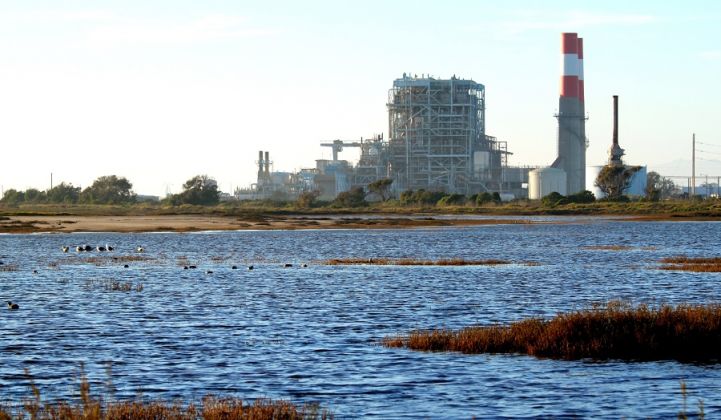Independent power producer Calpine has abandoned plans to build a new natural-gas plant in Southern California, swelling the ranks of recently canceled fossil fuel plants in the state.
The company withdrew its application for the Mission Rock plant in a letter to the California Energy Commission dated May 21. That decision ended a years-long conflict over the permitting of the plant, a 255-megawatt combustion turbine facility planned on the banks of the Santa Clara River in Ventura County, northwest of Los Angeles. The Native American Chumash people opposed the plant as a disruption to a river environment that they consider sacred.
The permitting battle also became a test case for new fossil fuel plant development as the Golden State moves toward its legislative goal of carbon-free electricity by 2045.
Mission Rock joins a string of recent gas plant cancellations in California. The state still relied on natural-gas generation for 34 percent of its electricity in 2017, but new gas construction there has become a rarity as market and policy headwinds intensify.
Earlier this year, Los Angeles Mayor Eric Garcetti opted to retire rather than replace three coastal gas plants serving the municipal utility. Last year, Glendale's city council paused a $500 million gas peaker project that its municipal utility staff wanted to build, choosing instead to solicit clean energy alternatives.
CEC regulators objected in 2017 to the siting of NRG’s Puente Power Plant on the shores of Oxnard, prompting utility Southern California Edison to replace the gas project with a portfolio of energy storage facilities that were announced last month.
Puente had a contract with SCE to deliver local reliability to that grid-constrained region. Mission Rock would have operated just a few miles inland from Puente, but it lacked a utility contract to guarantee revenue. Instead, it would have provided merchant power to California's wholesale markets, where business has not been kind to merchant producers lately.
Calpine appears to have bet on Mission Rock as a backup option for SCE, in case the utility's contract for local capacity in the Oxnard area failed.
The developer last year asked to suspend its application until the resources contracted to solve the local grid needs were “final, non-appealable, constructed, and operating.” Regulators granted that request, allowing Calpine to wait and see how the competition shaped up.
Calpine's decision to walk away from the project comes a few weeks after SCE announced the battery plants it picked in place of the Puente gas plant. Calpine could have waited until those batteries were up and running, but it would still face headwinds from the local opposition that would ask regulators to rule the same way they did with Puente.
Some gas still on the horizon
Mission Rock did not die because regulators rejected it. That means that gas plants could still win approval in California, if the state's energy agencies do not assess applications differently as a result of the 100 percent clean electricity law.
Whether or not new gas plants make economic sense for developers is another matter.
"California setting this pathway toward 100 percent clean energy has had important and profound impacts, and it also shows the ways in which California has not been as bold," said Earthjustice attorney Angela Johnson Meszaros. “The CEC essentially let Calpine decide if the application would continue through the process.”
Since California's power market deregulation, developers no longer have to establish a need for energy in order to build a power plant and bid into the markets, noted Meszaros, who intervened against Mission Rock on behalf of the native-led nonprofit Wishtoyo Foundation.
A handful of previously approved gas plants are working their way through construction to commercial operation. The elimination of Mission Rock, though, narrows the list of new gas plants seeking approval as California moves toward the legally mandated deadline of 2045 to remove carbon emissions from power production.
The remaining serious contender is the Glendale project (technically a repowering of the existing Grayson Power Plant), said Evan Gillespie, Western region director at Sierra Club's Beyond Coal campaign and a long-time tracker of California gas plants.
The Palmdale Energy Project could also come to fruition. It's an odd duck, having worked its way through the California Energy Commission since 2008, a markedly different time for the state's electrical system.
The latest iteration of the Palmdale project features a 654-megawatt combined-cycle gas plant, which developer Summit Power describes as "a quick-start flexible capacity resource that will play a critical part in integration of added renewable resources."
That plant initially won approval for construction in 2011, and was later amended; it's unclear whether such a project remains economic in the near-term California market environment. It also faces multiple legal challenges.
The thinning pipeline and recent string of failed gas plant developments raise the possibility that California won't build any more new plants.
"I really think that we have turned the corner on building or investing in gas in California," Meszaros said. "It’s increasingly difficult for people to say they prefer a technology that has these negative impacts."
The 2045 deadline sets a countdown for any new plants to pay themselves off, Gillespie said. While 25 years may seem like a long time, it's a typical amortization period for a gas plant. The business case becomes even more challenging when the operating lifetime is capped by legislation.
Meanwhile, clean options like solar power and energy storage keep getting cheaper and more competitive with gas, he added. Utilities, regulators and advocates are gaining more experience in evaluating zero-carbon portfolios to meet grid needs.
"We’re still a decade or two away from being able to really fully get off of gas, but it’s coming soon," Gillespie said. "You’re not going to see any new proposals come forward at this point that are going to get serious airtime from regulators, utilities or the public."




